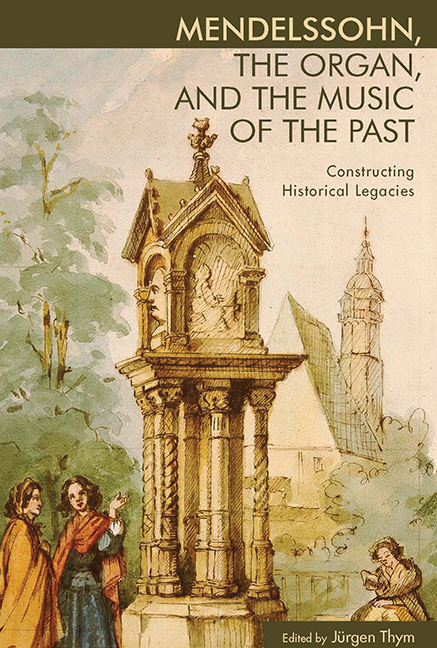Book contents
- Frontmatter
- Dedication
- Contents
- Acknowledgments
- Introduction: Of Statues and Monuments
- Part One Composition and Tradition
- Part Two Mendelssohn and the Organ
- 4 Mendelssohn and the Organ
- 5 Some Observations on Mendelssohn's Bach Recital
- 6 “He Ought to Have a Statue”: Mendelssohn, Gauntlett, and the English Organ Reform
- 7 Mendelssohn's Sonatas, Op. 65, and the Craighead-Saunders Organ at the Eastman School of Music: Aspects of Performance Practice and Context
- Part Three Mendelssohn's Inherited Legacies in Context
- List of Contributors
- Index
7 - Mendelssohn's Sonatas, Op. 65, and the Craighead-Saunders Organ at the Eastman School of Music: Aspects of Performance Practice and Context
from Part Two - Mendelssohn and the Organ
Published online by Cambridge University Press: 14 March 2018
- Frontmatter
- Dedication
- Contents
- Acknowledgments
- Introduction: Of Statues and Monuments
- Part One Composition and Tradition
- Part Two Mendelssohn and the Organ
- 4 Mendelssohn and the Organ
- 5 Some Observations on Mendelssohn's Bach Recital
- 6 “He Ought to Have a Statue”: Mendelssohn, Gauntlett, and the English Organ Reform
- 7 Mendelssohn's Sonatas, Op. 65, and the Craighead-Saunders Organ at the Eastman School of Music: Aspects of Performance Practice and Context
- Part Three Mendelssohn's Inherited Legacies in Context
- List of Contributors
- Index
Summary
Mendelssohn, Bach, and Eighteenth-Century German Organ Culture
Felix Mendelssohn was brought up in a home in which the classical-humanistic education was the ideal and the music of Johann Sebastian Bach (1685–1750) and his circle, the essence. Mendelssohn's mother, Lea Salomon, a student of Johann Philipp Kirnberger (1721–83), took care of the musical education of her children, and made sure that the Well-Tempered Clavier (hereafter WTC) was studied and played continuously. When Felix, at age eleven, started studying the organ with August Wilhelm Bach (1796–1869), one of the most influential organists in Germany and the leading organ authority in Berlin during the first decades of the nineteenth century, he already knew most of the Preludes and Fugues of the WTC. Under the tutelage of A. W. Bach (not related to Johann Sebastian), he tried them out on the organ, and started building his repertoire, primarily focusing on organ works by J. S. Bach. Felix studied the piano with Ludwig Berger (1777–1839), one of the greatest piano virtuosos in Germany of his time, and composition (counterpoint, canon, fugue, etc.) with Carl Friedrich Zelter (1758–1832), the ultimate musical authority of the city. Zelter was the director of the Berlin Sing-Akademie, and in this capacity initiated and led performances of many of Bach's major choral works. The entire Mendelssohn family, including Felix, his parents, and his sister Fanny, was enrolled in the Sing-Akademie. His great aunt, Sara Levy, had been a student of Wilhelm Friedemann Bach (1710–84), and was now one of Berlin's leading musicians and musical patrons. She possessed many autographs and copies of J. S. Bach's music, and gave Felix a copy of the St. Matthew Passion in 1823.
In the late eighteenth and early nineteenth centuries, Berlin was the center for the cultivation of the musical heritage of Johann Sebastian Bach. It was exceptionally well equipped with high-quality eighteenth-century organs. Arp Schnitger and his son, Franz Caspar, were represented with three instruments, and Joachim Wagner, whose instruments Bach had praised, with seven organs, among them three of the largest in the country: the organs in St.
- Type
- Chapter
- Information
- Mendelssohn, the Organ, and the Music of the PastConstructing Historical Legacies, pp. 141 - 210Publisher: Boydell & BrewerPrint publication year: 2014

